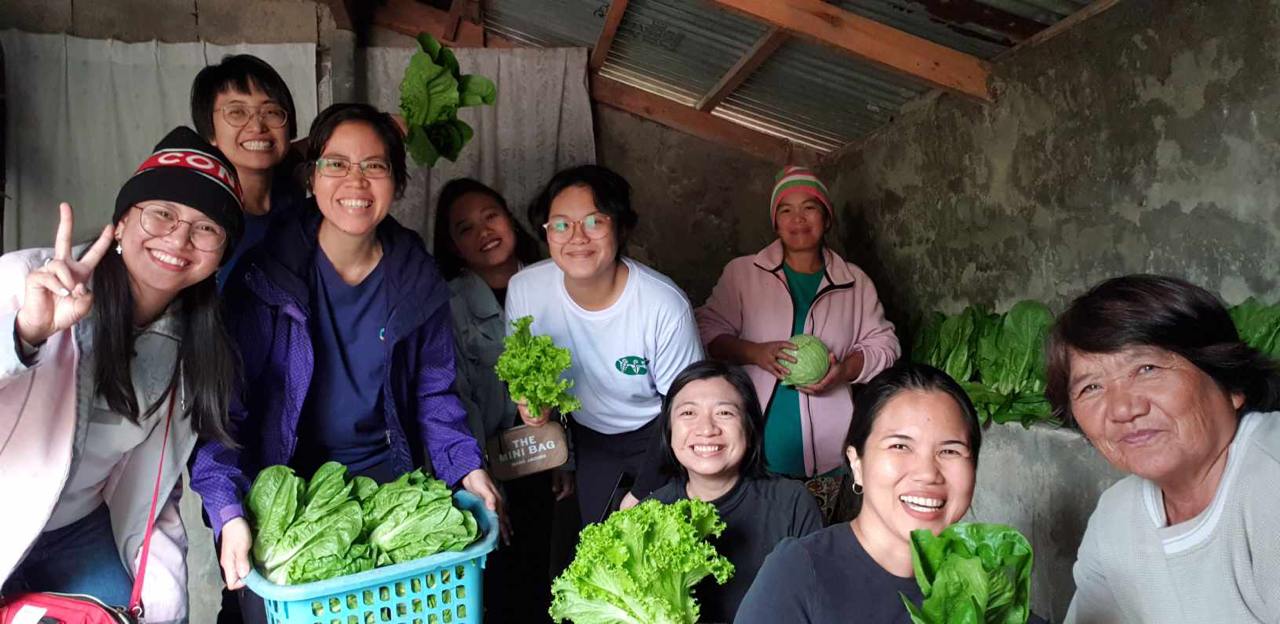Our Workplace Diversity Policy

Diversity is a key concept in our Pamayanihan CSA model. We recognize its various benefits.
Crop diversification means our partner farmers are food secure, and subscribers can enjoy a varied and nutritious diet. It means we protect the environment as we rely on natural ways and functioning ecosystems to grow food, control pests and diseases, and build the soil.
We believe that diversity/biodiversity offers material benefits to the local economies we support, enhances our physical and psychological well being, and promotes the security and resilience of partner communities.
It also teaches us to recognize and respect the different socio-economic backgrounds, and the various ethnic, cultural, spiritual, and gender identities of everyone in our ecosystem.
These include historically marginalized and vulnerable sectors made impoverished by systemic inequality: small farmers and the urban poor, and we recognize the extra layer of vulnerability that women farmers and women urban poor face.
As a social change organization that seeks to be effective in our work and to be true to the Pamayanihan model as a model of solidarity, Good Food Community seeks to embody, protect, and promote diversity.
Diversity is the honest reflection of the context we operate in. We consider it a source of strength and it enriches our work and the value we are able to offer our partner communities.
We commit to promoting a culture of respect, inclusivity, fairness, equality, and equity at Good Food, and shall actively model the behavior enshrined in this policy.
We will not unlawfully discriminate against anyone being part of our community–whether as a member of the team, as a volunteer, subscriber, affiliate, supplier, or partner–because of their age, gender and sexual orientation, race or ethnicity, association, religion or spiritual belief, disability, or marital/civil partnership status. We will make sure that no one feels diminished or disrespected, is bullied or treated unfairly or with prejudice, victimized, or harassed in their interactions with Good Food and its team members.
Through this policy we shall support members of our team so that they are able to practice and live out this policy in their different roles, responsibilities, and activities. We shall actively challenge biases, prejudices, and discrimination and hold each other accountable for failures and breaches to this policy.
Principles and Practices
1. Gender-neutral recruitment and hiring
Good Food Community is open to all individuals who wish to be part of the team, whether as full-time or part-time employees or as volunteers, and shall ensure that its job postings, job descriptions, job titles, and volunteer opportunities do not reflect any gender bias and avoids charged language that may limit the pool of applicants or provide undue preference for a particular group or advance a stereotype.
Announcements shall emphasize a commitment to diversity and inclusivity to signal these priorities to interested persons. Pregnant women or workers with family responsibilities will never be discriminated against in relation to employment conditions, compensation, job opportunities, and their development in Good Food.
2. Pay equity and pay transparency
We are an equal opportunity, non-hierarchical organization. While we are a small company with limited resources, we strive to distribute/allocate these resources fairly, valuing each person’s labor and believing that each team member brings a unique set of skills, knowledge, and experience that enriches our work, strengthens the organization, and brings us closer to our vision. We value our teammates’ contributions equally and reflect this value in our commitment to pay equity, and we normalize transparency when it comes to our salary given secrecy breeds discrimination.
We strive to provide compensation that helps our employees support themselves and their families by complying with government-mandated benefits (Social Security System, Philhealth, PAGIBIG Fund) and offering vacation leave, sick leave, and family/carer’s leave entitlements above and beyond what is required by law; weekly gulay ayuda and employer-subsidized costs of agricultural produce; transportation and communication reimbursements; work travel per diem; employee-assistance loans at zero interest and deferred payment.
We recognize that gender pay gaps exist in the agricultural sector, and we address this through our Pamayanihan model, which has been identified by our partner farmers as an appropriate women-friendly model given its emphasis on securing healthy, biodiverse food and providing fair and stable income to women farmers.
3. Putting value on care work
We recognize the diversity in the life situations of each team member and that each has reproductive/care work beyond Good Food Community. As such we commit to creating a workplace that acknowledges these varied life situations and the care roles and the relationships attending these life situations. As the line between work and life outside of work continues to blur and work intensifies, we recognize that this specifically overburdens women with paid and unpaid care work.
As such we conduct quarterly* consultations and decide collectively on our social infrastructure of care. The entire team comes together when it comes to establishing family-friendly strategies to promote work-life balance, including potential conflicts in family responsibilities, and make the needed adjustments together. We offer flexible time and work from home options. We honor each team member’s need to establish boundaries (e.g., fixed coordination hours to avoid 24/7 availability, digital detox or Zoom-free days, etc.) and make sure that the weekly team calls allow everyone to share this and how they may be supported. We undertake collective decision-making on workload, deadlines, and the pace of our work; offer the option of bringing their child to work when needed. We are currently working on implementing an effective job sharing and redundancy plan. Through this principle we hope to emphasize that reproductive/care work enlarges and nourishes us as human beings and gives our life meaning, and that paid productive work or financial gains are not the sole measure of success in life.
Connected to the recognition and placing value on care work, we are exploring the concept of human-scale development (Manfred max-Neef) to have a more balanced, holistic approach to wellbeing. The model identifies nine fundamental human needs (subsistence, protection, affection, understanding, participation, leisure, creation, identity, and freedom) that need to be understood as a system, i.e., interrelated and interactive, and while considering the communities at large/larger context and group dynamics that these needs are either fulfilled/supported or not.
4. “Nothing about us without us"
We work directly with members of marginalized groups, specifically the urban poor, women, and small farmers. We recognize our privileged position, and no program, project, or intervention shall be undertaken without representation, consultation, and participation from these groups.
Our Farmer Development Plan, captured in our Inclusive Procurement Policy, guides the participatory governance approach when working with farmers, while work with the urban poor communities is guided by the volunteer-driven Slow Food Sari-sari coalition that has representatives of the urban poor and community organizers as members.
5. Fostering health and safety
Given the ongoing pandemic, we conduct regular dialogues with the team and relevant stakeholders to establish safety protocols when it comes to operations, logistics, and distribution. We observe people’s right to privacy and confidentiality about their medical conditions, but strive to balance this with the right of people to be made aware of possible hazards.
6. Zero-tolerance for violence and harassment
It is important for Good Food to maintain a culture and a workplace that is safe for everyone and is free from any form of violence and harassment, and we take a zero-tolerance approach towards this objective. We define violence as any action/conduct/speech that directly or implicitly threatens to harm a person or property, whether verbally, physiologically or physically, including sexual assault.
We also consider it a violent act if it causes distress and offense, embarrasses and degrades another, provokes fear, and diminishes a person’s dignity or self-esteem. We define harassment as any unwelcome action, conduct, or speech that bullies, intimidates, humiliates, degrades, and offends another person due to their age, gender and sexual orientation, race or ethnicity, association, religion or spiritual belief, disability, or marital/civil partnership status. We take seriously any and all complaints of such nature by our team members, volunteers, partners, service providers, suppliers, visitors, subscribers, and others during the course of Good Food’s work activities.
Everyone is authorized to immediately report any potentially harmful, hostile, or dangerous situation during Good Food’s work activities to the management team or any GFC full-time employee, and we commit to conducting an immediate investigation of the reported incident. We respect people’s need to report them anonymously, and those incidents that require confidentiality will be handled as such, with pertinent information disclosed to relevant stakeholders on a need-to-know basis. Appropriate action will be taken in consultation with the parties involved, with the commitment to protect the rights of both the aggrieved and accused, including the right to privacy and confidentiality while balancing this with the rights of other workers to be informed of risks or hazards. We shall not engage in victim blaming, and shall strive to protect the complainant/s, victim/s, witness/es and whistle-blower/s against victimization or retaliation.
We believe in restorative and transformative justice and acknowledge that it is important to address and repair the harm caused by the offense, and for the offender to take full responsibility for their actions as a path to healing and reintegration. We believe in engagement and accountability, and will provide the parties involved and directly affected with the opportunity to identify their needs in the aftermath of the offense. We believe in respect, compassion, and fairness throughout all the stages of the investigation and its conclusion. Particularly egregious conduct will lead to dismissal. We understand that both the offending party and Good Food can be held liable for such actions and speech against fellow employees, volunteers, partners, and the public.
We shall be guided by the following Philippine laws on harassment and discrimination, specifically Anti-Discrimination Act, Safe Spaces Act (specifically Article IV, Article VI), Anti-Sexual Harassment Act, and Anti-Violence against Women and Children Act.

Join our Friends of Farmers Circle
Friends of Farmers gathers conscientious eaters who wish to help Filipino farmers and support our campaigns and advocacy work. Receive updates and ways you can participate.
